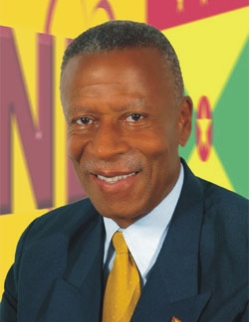Grenada Prime Minister Tillman Thomas says the Caribbean Community must resolve to make 2011 “a watershed year in the history of our integration movement” where all Caricom leaders play their part to build a strong, resilient and dynamic Caribbean region, in his New Year’s message.
Thomas, who is also the Chairman of the Conference of Heads of Government of the Caribbean Community, said as the Region welcomes the second decade of the century it must prepare itself to face and surmount the challenges which it continues to battle. He noted too that the end of the first decade was marked by the triumph of the human spirit over the ravages of nature as exemplified by the courage and resilience of the Chilean, Pakistani and Haitian people.

Thomas recalled that January marks one year since that two significant events occurred that have had lasting effects on the Region. The first was the January 12 earthquake which devastated Haiti, taking a terrible toll in human lives and wreaking widespread destruction of property. “The tragedy has continued with the dilatory response of the international community in meeting its financial pledges to assist in the reconstruction of Haiti,” he said, in a Caricom press statement.
“By year’s end not even a quarter of the amounts pledged had been delivered with the consequent deleterious, ruinous and slothful effect on the rebuilding process,” he added. Thomas pledged that the Caribbean Community, spearheaded by the Special Representative of the Heads of Government to Haiti, former Jamaica Prime Minister PJ Patterson, will continue to use every opportunity and seek to devise fresh initiatives in order to accelerate the process in 2011.
The situation in Haiti has been exacerbated by an outbreak of cholera which, apart from having already claimed close to 3,000 lives, has stretched beyond the limit, the capacity of the Haitian authorities already overburdened by the challenges posed in the aftermath of the earthquake. The Caribbean Community recommits itself to continuing and intensifying its assistance to Haiti in the year ahead.
The second event was the Special Summit on Youth Development hosted in Paramaribo, Suriname at the start of 2010. At that landmark event, the Caribbean Community Commission on Youth Development presented its report to the Heads of Government. According to the release, the years of research and the voice of the youth at the Summit clamoured for a quickening of the pace of the integration process and for greater involvement of Caribbean young people in decision-making. Thomas said the Heads responded and active consideration of new governance structures were put into place to improve the rate of implementation. One of the main ideas in taking the necessary steps will be tested in the New Year with the establishment of the Permanent Committee of Caricom Ambassadors (PCCA).
The Chairman also noted that the administrative structure of the Secretariat will be undergoing changes with the retirement of long-serving Secretary-General, Sir Edwin Carrington. He extended the “greatest appreciation to Sir Edwin for his tireless and inspiring leadership over the 18 years that he served the Governments and Peoples of the Caribbean Community in that position.” According to Thomas, Sir Edwin is an example of the kind of devotion and commitment necessary to achieve the goal of a viable, prosperous and secure Community for all. The Community will show its appreciation, when it confers on him its highest honour, the Order of the Caribbean Community.
Thomas also acknowledged that a rise in sea-level is one of the greatest threats to the existence of a number of small islands and low-lying coastal states; the effect of climate change. “As a world leader in the battle to restrict the limit of greenhouse gas emissions to ensure that global temperature does not rise more than 1.5 degree Centigrade above pre-industrial levels, the Caribbean Community is striving to ensure its very survival,” he said. Already in the Pacific region, island states are losing land to the rising seas which should serve as a warning for the Community to be more stringent in its demands to industrial giants that they must limit their emissions levels to no more than 1.5 “for us to stay alive.”
It is against this background and many other challenges, including the continuing effects of the global financial and economic crisis on Caribbean countries that the New Year begins. “We are convinced that unless we believe in our integration movement and so demonstrate by strengthening its bonds significantly, unless we continue to build on the co-operation with each other, unless we are prepared to use all the skills and tools at our disposal to build a strong CARICOM Single Market and Economy – particularly those available through Information and Communication Technology – we will not be able to combat those challenges successfully,” he said.




